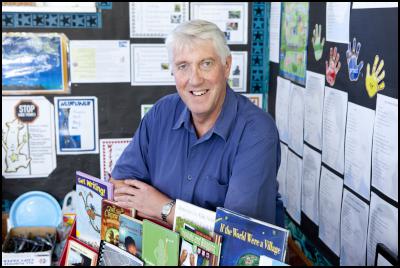Reading Recovery not responsible for underachievement
Reading Recovery not responsible for underachievement
August 12, 2013
A University of Canterbury (UC) education professor says Reading Recovery is not responsible for the lack of change in the long tail of underachievement in New Zealand school children, as recently suggested by some New Zealand researchers.
Professor Garry Hornby says Reading Recovery was developed in New Zealand in the 1970s by Dame Marie Clay and has been widely researched and implemented in many countries around the world.
``Reading Recovery is acknowledged as an intervention with extensive research evidence for its effectiveness by top researchers in education such as Professors John Hattie and Bob Slavin.
``Further, Reading Recovery is included in the What Works Clearinghouse in the USA which only includes educational interventions with the most rigorous research evidence supporting their effectiveness. So it seems bizarre to attempt to blame the lack of improvement in literacy achievement on Reading Recovery.
``The long tail of underachievement in New Zealand is not only evident in literacy but also in maths and science. This suggests that the cause lies not in our literacy provision but elsewhere.
``It is much more likely that the underachievement of our lowest 25 percent of children is due to weaknesses in our provision for many of these children, who have special educational needs.
``In comparison with other countries that do not have as big a tail of underachievement as New Zealand, such as the USA, UK and Finland, there are major weaknesses in our provision for children with special needs in New Zealand.
``We do not have specific legislation focusing on children with special needs, like that in the USA which sets out the rights of children with special needs and their parents and the responsibilities of the education system to meet their needs.
``We do not have a code of practice for special needs setting out what schools must provide, such as IEPs for children with moderate and severe levels of special needs, as in the UK.
``We do not have schools organized to identify the 30 percent of children with the lowest levels of achievement in first year of schooling and target them for additional specialist teaching and support, as they do in Finland.
``We do not have trained special needs coordinators in all of our schools, as is mandatory in the UK.
Also, the majority of our mainstream school teachers have had little or no training on teaching children with special needs.
``So let’s focus our attention where it is needed, on improving education provision for children with special needs. This is much more likely to have an impact on our long tail of underachievement than simply blaming Reading Recovery for not fixing it,’’ Professor Hornby says.

ENDS


 Hospice NZ: Sustainable Funding For Hospices
Hospice NZ: Sustainable Funding For Hospices David Hill - LDR: Surge In Young Parents’ College Enrolments
David Hill - LDR: Surge In Young Parents’ College Enrolments NZEI Te Riu Roa: School Lunches - Give Schools Option To Use In-School And Community Providers Immediately, Union Says
NZEI Te Riu Roa: School Lunches - Give Schools Option To Use In-School And Community Providers Immediately, Union Says University of Auckland: Billion-dollar Business Lessons From Kiwi Entrepreneur
University of Auckland: Billion-dollar Business Lessons From Kiwi Entrepreneur NZ Veterinary Association: NZVA Celebrates Welcome Additional Support From Veterinary Nurses
NZ Veterinary Association: NZVA Celebrates Welcome Additional Support From Veterinary Nurses Michael King Writers Centre: New Zealand’s National Writer-Residency Organisation Announces Its 2025 International Residency With Australia
Michael King Writers Centre: New Zealand’s National Writer-Residency Organisation Announces Its 2025 International Residency With Australia